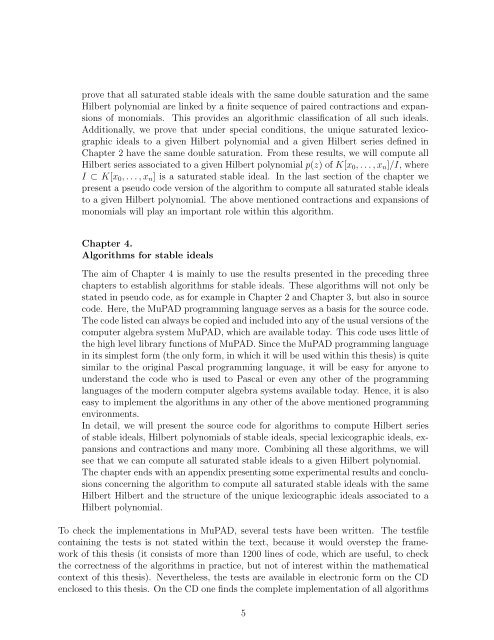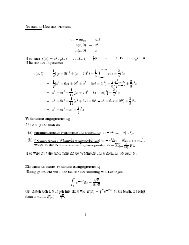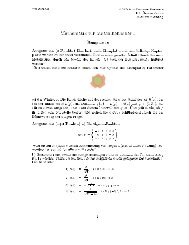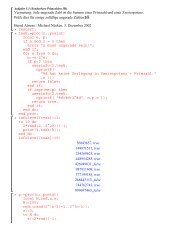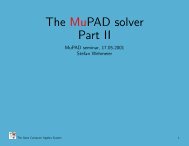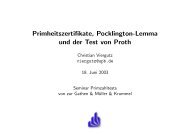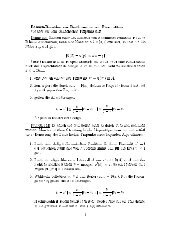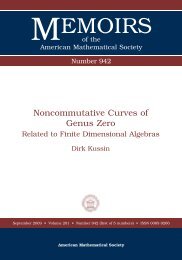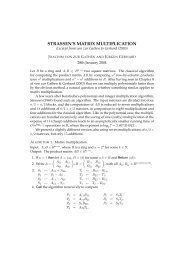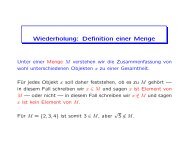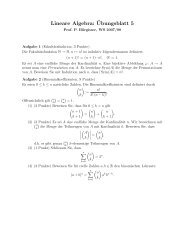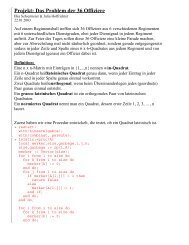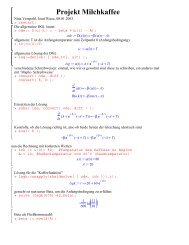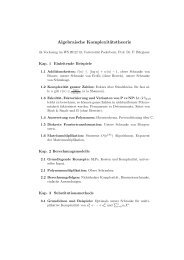University of Paderborn Department of Mathematics Diploma Thesis ...
University of Paderborn Department of Mathematics Diploma Thesis ...
University of Paderborn Department of Mathematics Diploma Thesis ...
Create successful ePaper yourself
Turn your PDF publications into a flip-book with our unique Google optimized e-Paper software.
prove that all saturated stable ideals with the same double saturation and the sameHilbert polynomial are linked by a finite sequence <strong>of</strong> paired contractions and expansions<strong>of</strong> monomials. This provides an algorithmic classification <strong>of</strong> all such ideals.Additionally, we prove that under special conditions, the unique saturated lexicographicideals to a given Hilbert polynomial and a given Hilbert series defined inChapter 2 have the same double saturation. From these results, we will compute allHilbert series associated to a given Hilbert polynomial p(z) <strong>of</strong> K[x 0 , . . . , x n ]/I, whereI ⊂ K[x 0 , . . . , x n ] is a saturated stable ideal. In the last section <strong>of</strong> the chapter wepresent a pseudo code version <strong>of</strong> the algorithm to compute all saturated stable idealsto a given Hilbert polynomial. The above mentioned contractions and expansions <strong>of</strong>monomials will play an important role within this algorithm.Chapter 4.Algorithms for stable idealsThe aim <strong>of</strong> Chapter 4 is mainly to use the results presented in the preceding threechapters to establish algorithms for stable ideals. These algorithms will not only bestated in pseudo code, as for example in Chapter 2 and Chapter 3, but also in sourcecode. Here, the MuPAD programming language serves as a basis for the source code.The code listed can always be copied and included into any <strong>of</strong> the usual versions <strong>of</strong> thecomputer algebra system MuPAD, which are available today. This code uses little <strong>of</strong>the high level library functions <strong>of</strong> MuPAD. Since the MuPAD programming languagein its simplest form (the only form, in which it will be used within this thesis) is quitesimilar to the original Pascal programming language, it will be easy for anyone tounderstand the code who is used to Pascal or even any other <strong>of</strong> the programminglanguages <strong>of</strong> the modern computer algebra systems available today. Hence, it is alsoeasy to implement the algorithms in any other <strong>of</strong> the above mentioned programmingenvironments.In detail, we will present the source code for algorithms to compute Hilbert series<strong>of</strong> stable ideals, Hilbert polynomials <strong>of</strong> stable ideals, special lexicographic ideals, expansionsand contractions and many more. Combining all these algorithms, we willsee that we can compute all saturated stable ideals to a given Hilbert polynomial.The chapter ends with an appendix presenting some experimental results and conclusionsconcerning the algorithm to compute all saturated stable ideals with the sameHilbert Hilbert and the structure <strong>of</strong> the unique lexicographic ideals associated to aHilbert polynomial.To check the implementations in MuPAD, several tests have been written. The testfilecontaining the tests is not stated within the text, because it would overstep the framework<strong>of</strong> this thesis (it consists <strong>of</strong> more than 1200 lines <strong>of</strong> code, which are useful, to checkthe correctness <strong>of</strong> the algorithms in practice, but not <strong>of</strong> interest within the mathematicalcontext <strong>of</strong> this thesis). Nevertheless, the tests are available in electronic form on the CDenclosed to this thesis. On the CD one finds the complete implementation <strong>of</strong> all algorithms5


